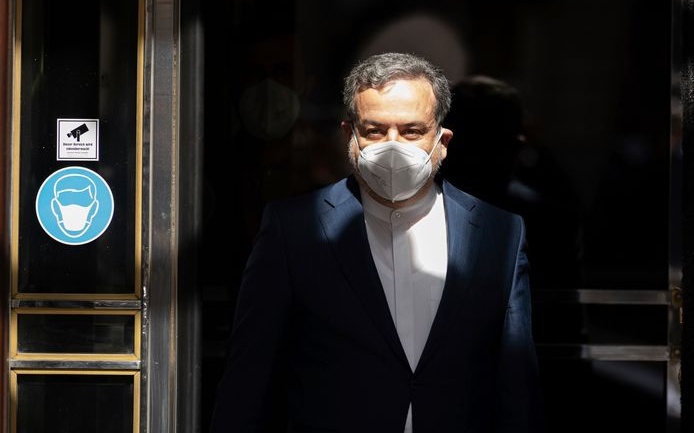Iran Deputy Foreign Minister Abbas Araqchi leaves the Grand Hotel Wien, site of indirect nuclear talks, Austria, Vienna, April 9, 2021 (Florian Schroetter/AP)
UPDATE, MAY 8:
The fourth set of indirect nuclear talks has opened in Vienna.
The head of Iran’s delegation, Abbas Araqchi, highlighted a positive resumption, while demanding more from the US over sanction relief.
The information transferred to us from the U.S. side is that they are also serious on returning to the nuclear deal and they have so far declared their readiness to lift a great part of their sanctions.
But this is not adequate from our point of view and therefore the discussions will continue until we get to all our demands.
#Iran DepFM (after Joint Commission plenary): Americans have so far announced their readiness to lift a large part of the sanctions. Of course, in our opinion, it is not complete yet, and that is why the negotiations will continue until we reach all our demands in this regard. pic.twitter.com/ckWYmkkmJ8
— Abas Aslani (@AbasAslani) May 7, 2021
A “senior European Union diplomat said, “We have a lot of things to do and a very very complex task because there are many details, many different issues to be resolved….Now, we are starting a very important round. It should be probably a longer round than the three before.”
UPDATE, MAY 7:
The Biden Administration has denied media reports that the US will permit the unfreezing of $1 billion in Iranian assets as a goodwill gesture in talks over the 2015 nuclear deal.
State Department spokesman Ned Price maintained the line that sanctions removal is linked to Iran’s return to compliance with the deal.
Reporting suggesting we are weighing the release of Iranian funds as a unilateral gesture to Tehran is not true, which we made clear prior to publication. As we have said, any substantial move by the U.S. would have to be part of a process in which both sides take actions.
— Ned Price (@StateDeptSpox) May 6, 2021
Iran is seeking the release of $7 billion in funds in South Korea. It held a South Korean oil tanker from January to April, releasing it as Prime Minister Chung Sye-kyun visited Tehran.
Secretary of State Antony Blinken said on Thursday, during a visit to Ukraine’s capital Kyiv:
What we don’t know is whether Iran is actually prepared to make the decisions necessary to return to full compliance with the nuclear agreement.
They unfortunately have been continuing to take steps that are restarting dangerous parts of their program that the nuclear agreement stopped. And the jury is out on whether they’re prepared to do what’s necessary.
ORIGINAL ENTRY, MAY 6: Talks over revival of the 2015 Iran nuclear agreement have stalled over Tehran’s uranium centrifuges, according to European diplomats and former US officials.
The sources said there are “big gaps” between the US and Iran, in the indirect discussions in Vienna, over measures to roll back and limit the centrifuges.
Suspending compliance with the deal because of US sanctions, Iran has installed and begun operations of advanced IR-2, IR-4, and IR-6 centrifuges — all beyond the limits in the 2015 agreement.
In January, Tehran resumed its pre-2015 level of 20% enriched uranium. Last month, after a deliberate explosion — probably organized by Israel — in its Natanz nuclear facility, Iran carried out enrichment of 60% uranium for the first time.
The production is still short of 90% military grade, but reduces the timeframe needed to reach that level.
The US and the European countries in the talks (UK, France, and Germany) all want provisions so Iran’s “breakout” time for sufficient uranium for a bomb is at least a year.
The US and European officials say there has been progress in the working group on US sanctions, but almost none on nuclear provisions.
The third set of discussions adjourned last weekend, with delegations returning home for consultations. The Vienna talks are expected to resume on Friday.
See also US — Iran Nuclear Talks “In An Unclear Place”
Using State outlet Press TV, Iranian officials said Tehran will not accept “new demands put forward by the United States and the Europeans”, including over the centrifuges. They warned that “unraveling altogether will be real”, complaining that the US has not agreed to remove all sanctions.


Opec crude output rises on Iranian recover: https://www.argusmedia.com/en/news/2212913-opec-crude-output-rises-on-iranian-recovery?backToResults=true
!Iran overtook Kuwait to become Opec’s fourth-largest producer, increasing output by 80,000 b/d to 2.35mn b/d last month, a level not reached since May 2019, according to Argus’ latest survey. Tehran has now added 400,000 b/d since October last year……Analysts estimate that Iran currently exports at least 650,000 b/d, much of it to independent Chinese refineries, which dilute it with light sweet crude.”
Iran is also increasingly exporting refined petroleum which is much easier to export and has a higher value.
I never thought there was any humanity in mullahs, but how far they go in savagery…..
Iranian Baha’is Told To Bury Loved Ones Atop Mass Graves Of Political Prisoners
https://www.rferl.org/a/iran-bahais-told-to-bury-dead-atop-mass-graves/31234288.html
This is in part to whitewash (if this is possible at all) the murders of late 80s by suppressing bahai’s